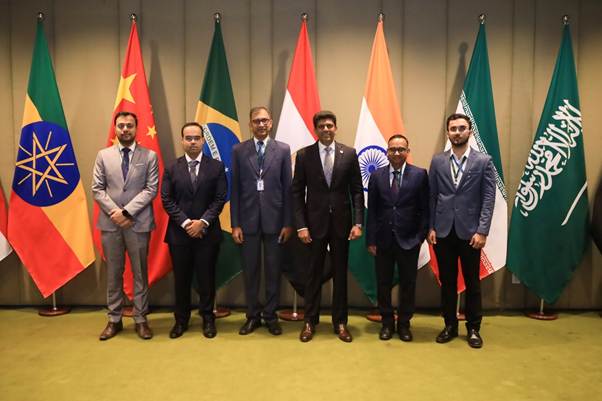BRICS nations adopt final declaration to promote cross-border digital innovation and sustainability.
NEW DELHI: India reaffirmed its commitment to inclusive, sustainable, and future-ready digital development during the 11th BRICS Communications Ministers’ Meeting held in Brasília, Brazil. Representing the Government of India, Dr. Pemmasani Chandra Sekhar, Minister of State for Communications and Rural Development, delivered the country’s statement, aligning India’s priorities with the overarching theme set by Brazil’s BRICS presidency: Universal and Meaningful Connectivity, Space Sustainability, Environmental Sustainability, and the Digital Ecosystem.
Delivering India’s national statement, Dr. Chandra Sekhar presented India’s Digital Public Infrastructure (DPI) as a global benchmark for inclusive and transformative digital governance. The Minister highlighted the pivotal role of flagship initiatives like Aadhaar and the Unified Payments Interface (UPI) in advancing universal and meaningful connectivity. He noted that Aadhaar has empowered over 950 million citizens with a secure digital identity, enabling seamless access to essential public and private services. UPI, he emphasized, has revolutionized real-time digital payments and now accounts for 46% of global digital transactions.
Dr. Chandra Sekhar credited this remarkable digital progress to the visionary leadership of Prime Minister Shri Narendra Modi, under whose guidance India has built a scalable, inclusive, and resilient digital ecosystem that is inspiring countries around the world.
He called upon BRICS nations to deepen collaboration in harnessing digital public infrastructure to drive inclusive growth and build resilient digital economies. He underscored that India’s DPI model—built on open, interoperable platforms—serves as a catalyst for financial inclusion, good governance, and digital innovation, while also guarding against monopolistic practices.
Dwelling on India’s vibrant startup ecosystem, robust digital skills initiatives, and progressive legislation such as the Telecommunications Act and the Data Protection Act, Dr. Sekhar emphasized the importance of trust and user safety in the digital age.
He also spoke about India’s Sanchar Saathi initiative—a key effort to combat telecom fraud—and called for enhanced BRICS cooperation in cybersecurity, data protection, and digital trust to ensure the safety and integrity of interconnected digital societies.
Dr. Chandra Sekhar highlighted India’s digital journey celebrating the transition from digital divide to digital leadership. India’s ambitious Digital Bharat Nidhi programme was showcased as a cornerstone initiative, funding landmark projects such as BharatNet, which now connects over 218,000 village councils with optical fiber infrastructure. India’s indigenous development and mass deployment of 4G and 5G technologies have enabled near-universal high-speed connectivity, now covering over 95% of the population with 4G and more than 80% with 5G. The country has also emerged as a global leader in affordable digital access, with the lowest data rates worldwide—just 12 cents per gigabyte.
On space sustainability, Dr. Chandra Sekhar emphasized that space is no longer a distant frontier but an integral part of modern digital infrastructure. India has implemented critical reforms, such as streamlined SATCOM regulations and the expansion of licensing frameworks to include mobile and IoT satellite services. He stressed the need for BRICS nations to lead global discourse on orbital equity, spectrum governance, and space traffic management, calling for cooperative rather than competitive approaches to shared orbital resources.
Turning to environmental sustainability, Dr. Chandra Sekhar acknowledged the growing climate and e-waste challenges posed by digital expansion. Citing alarming projections from the Global E-Waste Monitor, he warned of a potential 82 billion kilograms of e-waste by 2030. India’s leadership on this front includes initiatives like the Green Development Pact introduced at the G20 Summit in Delhi and the Panchamrit commitments announced at COP-26. Dr. Sekhar called on BRICS members to adopt circular economy models, embrace green energy in ICT infrastructure, and support global frameworks like the ITU’s Green Digital Action.
Earlier, welcoming the adoption of the Final Declaration, Dr. Sekhar commended the collaborative spirit among BRICS nations and acknowledged the expanded membership’s role in enriching the dialogue. He reiterated India’s belief that BRICS is not merely a platform for engagement, but a collective of co-creators working toward digital equity and resilience. He commended Brazil’s leadership as host and the clarity of vision reflected in the Declaration, especially in light of BRICS’ expanding global footprint.
“India’s model is transformational, rooted in civilizational wisdom and technological innovation. Our approach is not transactional, but inclusive—built on the principles of equity, access, and innovation,” he remarked.
Dr. Chandra Sekhar concluded by extending an invitation to all BRICS nations for the 12th BRICS Communications Ministers’ Meeting, to be held in India in 2026. Quoting the ancient Indian ethos of Vasudhaiva Kutumbakam—the world is one family—he reaffirmed India’s commitment to the shared vision of One Earth, One Family, One Future as the guiding light for global digital cooperation.
The 11th BRICS Communications Ministers' Meeting is part of the wider BRICS framework, which includes regular summits of leaders and ministerial gatherings. These meetings offer a platform to discuss and coordinate on shared priorities across member nations.


